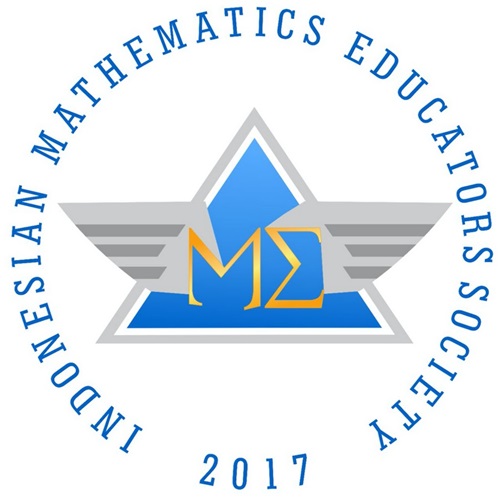Analisis Kebutuhan Buku Ajar Bahasa Inggris Matematika Berbasis Collaborative Learning Untuk Mahasiswa Pendidikan Matematika
DOI:
https://doi.org/10.22437/edumatica.v10i2.10446Kata Kunci:
Kebutuhan, Bahan Ajar, Bahasa Inggris Matematika, Collaborative LearningAbstrak
Abstrak
Buku adalah bahan ajar yang didesain untuk disajikan sebagai bahan cetak yang disusun secara sistematis sehingga dapat digunakan peserta didik untuk mencapai tujuan pembelajaran. Guru dan dosen harus memiliki kemampuan untuk mengembangkan bahan ajar sesuai dengan kebutuhan peserta didiknya. Tujuan penelitian ini adalah untuk mendeskripsikan kebutuhan mahasiswa matematika terhadap buku ajar bahasa inggris matematika berbasis Collaborative Learning. Metode penelitian ini adalah deskriptif kualitatif. Subjek penelitian adalah 21 mahasiswa pendidikan matematika FKIP Universitas Pasir Pengaraian yang telah menyelesaikan mata kuliah bahasa inggris. Data yang dikumpulkan melalui angket dan wawancara dengan indikator: (1) kemudahan mahasiswa dalam mempelajari bahasa inggris (2) kebutuhan mahasiwa untuk menguasai bahasa inggris dalam menghadapi era Masyarakat Ekonomi ASEAN (MEA), (3) kebutuhan mahasiswa terhadap sumber belajar bahasa inggris matematika, (4) kebutuhan mahasiswa terhadap buku ajar melibatkan siswa untuk aktif membaca, menulis, dan berdiskusi (5) kebutuhan mahasiswa terhadap tampilan buku ajar bahasa Inggris matematika yang menarik, mudah dibawa dan bernilai ekonomis (6) ketertarikan mahasiswa terhadap buku ajar berbasis Collaborative Learning. Hasil penelitian menunjukkan bahwa mahasiswa membutuhkan buku ajar bahasa inggris matematika berbasis Collaborative Learning
Kata Kunci: Kebutuhan, Bahan Ajar, Bahasa Inggris Matematika, Collaborative Learning
Unduhan
Referensi
DAFTAR PUSTAKA
Apriono, D. (2013). PEMBELAJARAN KOLABORATIF: Suatu Landasan untuk Membangun Kebersamaan dan Keterampilan. DIKLUS Jurnal Pendidikan Luar Sekolah, 292-304.
Dauyah, E., & Yuinar. (2018). Faktor-faktor Yang Mempengaruhi Motivasi Belajar Bahasa Inggris Mahasiswa Non-Pendidikan Bahasa Inggris. Jurnal Serambi Ilmu, 196-209.
Depdiknas. (2008). Kurikulum Pendidikan Dasar Bidang Studi Matematika. Jakarta: Pusat Perbukuan Depdiknas.
Dimas, Arifian ; Cari, C; Suparmi, A; Sarwanto , Sarwanto; Handhika, Jeffry ;. (2017). Profil Analisis Kebutuhan Bahan Ajar Mahasiswa Materi Dinamika Gerak Pada Mata Kuliah Fisika Dasar. Seminar Nasional Fisika dan Aplikasinya (pp. 42-45). Surakarta: Universitas Sebelas Maret.
Irawati, H., & Saifuddin, M. F. (2018). Analisis Kebutuhan Pengembangan Bahan Ajar Mata Kuliah Pengantar Profesi Guru Biologi Di Pendidikan Biologi Universitas Ahmad Dahlan Yogyakarta. BIO PEDAGOGI Jurnal Pembelajaran Biologi, 96-99.
Karimah, Iffah; Suhendri, Huri; Werdiningsi, Condro Endang;. (2019). Peranan Metode Collaborative Learning Terhadap Pemecahan Masalah MAtematika. JUrnal Kajian Pendidikan Matematika, 155-162.
Majid, A. (2006). Perencanaan Pembelajaran. Bandung: PT Remaja Rosdakarya.
Prastowo, A. (2011). Panduan Membuat Bahan Ajar Inovatif: Menciptakan Metode Pembelajaran yang menarik dan Menyenangkan. Yogyakarta: Diva Press.
Putra, A., & Syarifuddin, H. (2019). Analisis Kebutuhan Pengembangan Lembar Kerja Siswa Berbasis Penemuan Terbimbing Kelas VIII Sekolah Menengah Pertama. Jurnal Edukasi Matematika dan Sains, 39-49.
Rachmawati, S. W. (2004). Anatomi Buku Ajar. Jakarta: Departemen Pendidikan Nasiona.
Rahmadani, H., Roza, Y., & Murni, A. (2018). Analisis Kebutuhan Bahan Ajar Matematika Berbasis Teknologi Informasi di SMA IT Albayyinah Pekanbaru. Juring (Journal For Research in Mathematics Learning) , 91-98.
Rizal, S. (2013). Analisis Kebutuhan Bahan Ajar Bahasa Inggris IAIN Bengkulu Melalui Students' Need Anaysis. Jurnal At-Ta'lim, 232-252.
Sugiyono. (2009). Metode Penelitian Pendidikan Kualitatif, Kuantitatif dan R&D. Bandung: Alfabeta.
Taqiyyah, S. A., Subali, B., & Handayani, L. (2017). Implementasi bahan ajar sains berbahasa inggris berbasis metakognitif untuk meningkatkan kemampuan pemecahan masalah siswa SMP. Jurnal Inovasi Pendidikan IPA, 1-11.
Thiagarajan, S., Semmel, D. S., & Semmel, M. I. (1974). Instructional Development for Training Teachers of Exceptional Children: A Sourcebook. Indiana: Indiana University.
Unduhan
Diterbitkan
Versi
- 29-10-2020 (3)
- 29-10-2020 (2)
- 28-10-2020 (1)
Cara Mengutip
Terbitan
Bagian
Lisensi
Hak Cipta (c) 2020 Hera Deswita, Batdal Niati

Artikel ini berlisensiCreative Commons Attribution-NonCommercial-ShareAlike 4.0 International License.







